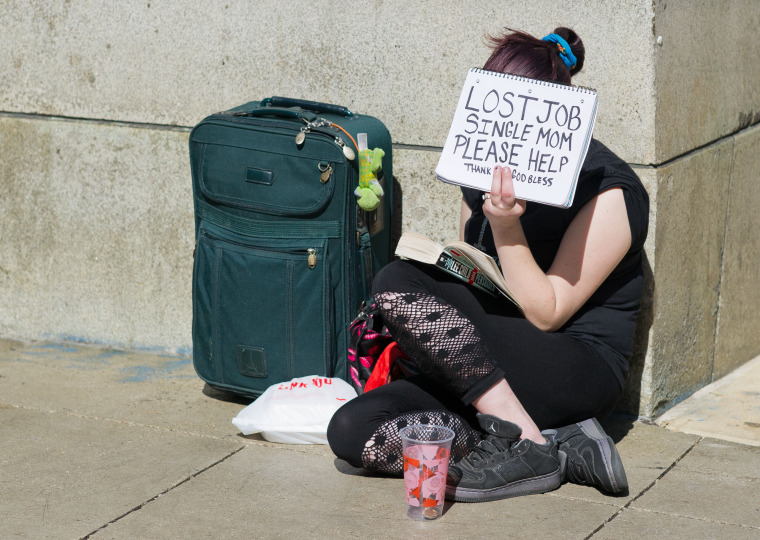Since Genesis, society has contemplated its obligation to our fellow man asking, "Am I my brother’s keeper?" But perhaps, all this time, we have pondered the wrong question. In confronting poverty, the data causes us to wonder instead, are we our mother’s keepers? And if we agree that we are or should be, then we have clearly failed.
Mothers are the custodians of the world’s poverty. The vast majority of the world’s poor are women and girls. A 2010 United Nations report found that in 85% of the 60 countries surveyed, women were poorer than men. Further, in countries that fail to provide support for mothers, single mothers are far more likely to be poor.
This is not a developing country phenomenon. For example, these data hold true for European nations and the United States.
According to the United States Census Bureau, more than 17 million American women lived in poverty in 2010 while only 12.6 million men were in similar circumstances. Of those women, 7.5 million lived in extreme poverty, meaning their incomes were half the level determinative of poverty by the U.S. Government. It was the highest rate of extreme poverty the nation has seen since it began tracking this data.
And the brunt of the pain of American poverty rests on mothers, women of color and elderly women. In 2010, 40% of single mothers lived in poverty, and another 25.6% of black women and 25% of Hispanic women were poor. That year, twice as many women over the age of 65 lived in poverty as compared to men.
So perhaps all this time, sexism has blinded us from observing the cure to poverty. By supporting women and mothers in their struggle against poverty, society may in fact, yield a solution to poverty writ large. And again, the data makes the case.
In 1990, the United Nations developed the Human Development Index (HDI) to provide a single statistic compiling 187 countries’ data on health, education, life expectancy, income, economic growth, living standards, and other factors to measure and compare human progress. The countries at the high end of the HDI have the best human outcomes with the largest middle classes and the lowest poverty rates.
Norway has the highest HDI score in the world. Norwegians lead the world in educational standards, life expectancy, health care, economic growth and more. The country also has the world’s lowest poverty rate. And of course Norway has some of the world’s most progressive policies in support of women and mothers. Consider the Norwegian maternity leave policy. Women are required to take a minimum of nine paid weeks off related to their pregnancy: three weeks before the due date and six weeks after the baby is born. Both parents may then take 46 weeks of paid leave at 100% of their salary or 56 weeks of paid leave at 80% of their salary.
Compare that to the United States of America which provides zero weeks of paid pregnancy leave. American women who have worked for a year or more at a company with more than 50 employees are allowed 12 weeks of unpaid leave under the Family Medical Leave Act of 1993.
Of 186 countries measured in the Gender Inequality Index, the United States ranked 44th and Norway ranked fifth. The poor ranking makes sense when you consider that American women make only 77 cents for every dollar paid to men, resulting in more than $11,000 in lost wages per woman, per year and nearly for half of a million dollars in lost wages over most women’s lifetimes.
And if Republicans have their way, the United States gender gap will worsen.
Just in time for Mother’s Day, Congress last week considered the the Working Families Flexibility Act. The bill’s title is a misnomer, so do not be fooled. The act would allow employers to end overtime pay and instead allocate comp time to employees who work more than 40 hours per week. But the employer would reserve the right to limit or deny employees the opportunity to use the comp time they have earned.
That’s right: the bill would allow employers to force staff to work overtime and not pay them. Alabama Republican Rep. Martha Roby’s Working Families Flexibility Act would steal income and options from families and guarantee flexibility and greater profitability for corporations.
Under this proposal, employment opportunity, middle income status, and income parity would only float further out of reach for many women and mothers in the United States.
To paraphrase the GOP message: Happy Mother’s Day, now get back to work.
Clearly, solving poverty is complex and ripe with theories and opinions from smart people. But there is no doubt, that women disproportionally shoulder the burden of poverty. Affording women equal rights, fair salaries, maternal support and the right and easy access to reproductive health care will go a long way stemming poverty. We must be other mothers’ keepers.
James Perry is the executive director of the Greater New Orleans Fair Housing Action Center and a former mayoral candidate in New Orleans. He is also, of course, the husband of host Melissa Harris-Perry. He was a guest during Sunday's special-edition "MHP" on poverty; see a segment below.
